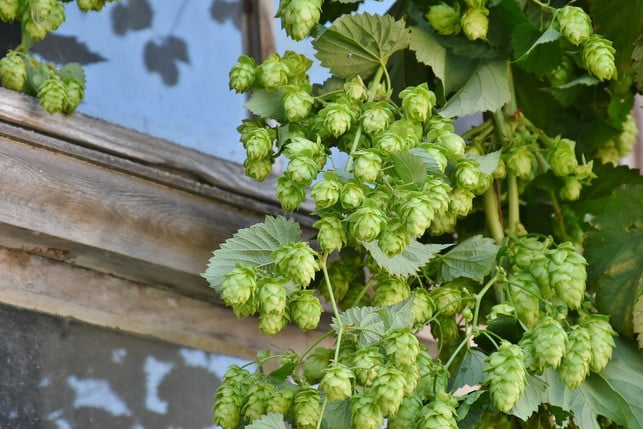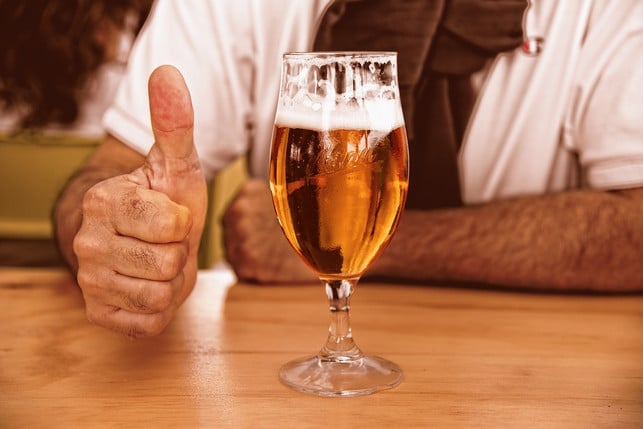
Beer is healthy, you read again and again. Unfortunately, the health -promoting fabrics in beer have a powerful opponent: alcohol.
Beer may be the most popular alcohol -containing drink in Germany. According to the German Braubund, the Germans consumed an average of over 100 liters per capita in 2018. In 2017, only the Czech was drank throughout Europe: inside and the Austrians: more beer inside.
With good reason? Again and again you read that beer has healthy properties: beer should be isotonic, i.e. supply the body with minerals, energy and liquid, can help against sore throats and counteract a hangover. It should even be sleep-promoting and calming, reduce the risk of cardiovascular diseases and strokes that increase lust or act against hair loss.
Where do these claims come from? To answer this question, we have to deal with the ingredients of beer.
Is beer healthy? A look at the ingredients

A (sub -fermentation) beer that was brewed according to the German purity requirement may only contain these ingredients:
- Barley malt
- hop
- Water
- Yeast
The barley contained and the hops could actually be healthy ingredients.
Barley ensures that beer contains vitamins B2, B3, B5 and B6. They play a crucial role, especially for the various metabolic processes in the body. Gerste also delivers some minerals such as potassium, magnesium and phosphorus.
The nutritional values per 100 milliliters of warehouse beer and the recommended daily dose (in brackets) in detail:
- Vitamin B2: 0.03 mg (1-1.4 mg)
- Vitamin B3: 0.65 mg (11-16 mg)
- Vitamin B5: 0.06 mg (6 mg)
- Vitamin B6: 0.1 mg (1.2-1.6 mg)
- Potassium: 35.33 mg (4000 mg)
- Magnesium: 7.54 mg (300-350 mg)
- Phosphorus: 19.42 mg (550 mg)
Hops themselves would be healthy

Hops contain various essential oils and bitter substances that may give beer healthy properties. Many of them should act as antioxidants in the body, i.e. be anti -inflammatory and protect cells. The focus of research is above all these substances:
-
Xanthohumol belongs to the polyphenols and only occurs in hops. Animal experiments showed that the substance can prevent tumor cells from growing and that contact dermatitis can help against skin disease.
-
ISO alphaic acids ensure the bitter taste in beer. In addition, scientists found: Inside the University of Erlangen-Nuremberg that the bitter substances have a positive effect on fat and sugar metabolism. You should be able to use them to treat fat liver. ISO alphasic acids and Xanthohumol should work primarily in combination.
-
Ferula acid is also an antioxidant substance. In animal experiments, she was able to prevent skin cancer. In addition, it may reduce the risk of neurodegenerative and cardiovascular diseases and diabetes.
Beer has healthy ingredients – is it healthy too?

The many positive findings on the individual ingredients of beer suggest that beer is actually healthy. However, the devil is in detail: On the one hand, there are no clinical studies in humans – so far, mainly testing has been tested on animals.
It is therefore unclear whether the ingredients actually develop their effect in the human body and help against the diseases mentioned. On the other hand, there are only tiny amounts of these substances in the beer – whether they look positive is doubtful.
Alcohol: Why beer is unhealthy

A big problem of beer is alcohol.
Already in 2018, a study that appeared in the journal The Lancet caused a sensation. Scientists: Inside, data from almost 600,000 people from 19 different countries analyzed it and came to the conclusion that 100 grams of pure alcohol per week can shorten life expectancy. In addition, alcohol increases the risk of cardiovascular diseases, high blood pressure and strokes-and possibly destroy the healthy effects of the other ingredients in beer.
The professional world is now agreed: there is no amount of health harmful to alcohol. Alcohol is poisonous, carcinogenic and is addictive. The risks begin with the first drop of alcohol and increase the more you drink.
If you want to benefit from the health -promoting properties of beer, so it is better to use non -alcoholic beer.
Is non -alcoholic beer healthy?
As a drink for athletes: non -alcoholic beer has been known for a long time because it is isotonic, delivers carbohydrates in the form of maltodextrin and supplies the body with minerals. However, there are two things to consider:
- “Non -alcoholic beer” sometimes contains small amounts of alcohol. Here you will learn more about this: alcohol-free vs. 0.0 beer: that is the difference
- Alcohol -free beer also contains a surprisingly large amount of sugar: around two to four grams per 100 milliliters
Alcohol -free beer is just as much suitable as a primary thirst quencher as conventional lemonade, for example. However, it can be part of a balanced diet as a supplement to water.
Revised by Denise Schmucker
Read more on utopia.de:
- Dry January: A month without alcohol is so useful
- Alcohol in the heat: why this is so dangerous
- Cooking with alcohol: does he really evaporate completely?
** marked with ** or orange underlined Links to sources of supply are partially partner links: If you buy here, you will actively support Techzle\.com, because we will then receive a small part of the sales proceeds. More information.